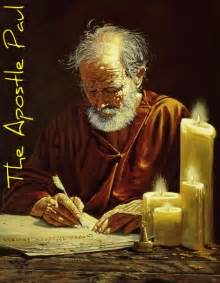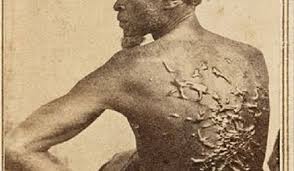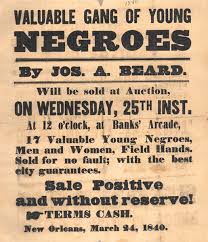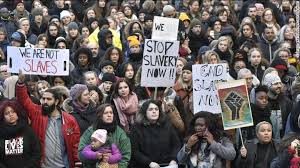Undoing Slavery, Then and Now
(Eph 6:1-9; Ps 145; Lk 13:22-30)
***************************************
“Slaves, be obedient to your human masters.”Could Paul be supporting slavery with this comment?
May our celebration today help us be more aware of the modern-day slavery still existing in our world, and motivate us to work at overcoming it any way we can.
Over the history of humanity, it takes time for some things to change. The civil rights movement in the States had to happen before there was any real improvement in the rights of Blacks there. In Canada, it was not until the 40’s women had the right to vote, and until the 50’s before the Indigenous peoples had freedom of movement. It was not until the time of JP II a pope dared to say all war was morally unjustified. So we can understand why St. Paul would put forward this teaching about slaves in Ephesians.

Taking a closer look, however, Paul’s teaching, whether he knew it or not, laid the groundwork for a worldwide abolitionist movement. The Letter to the Ephesians was written during a period when at least one out of every three persons in the Roman Empire was a slave. Slavery was an accepted institution supporting the social and economic structures of the culture. Sadly, slaves were considered tools of their masters and had few if any personal rights. Since slave owners exercised absolute mastery over their human property, some treated their slaves with vicious cruelty.

At a time when most people considered slaves as common property, Paul was saying everyone, including slaves, should be treated with respect and justice. Just as a slave should show respect for his or her master, so too should the master treat his or her slaves as fellow human beings, not as commodities. So, while Paul may not have overturned the institution of slavery, he did undermine one of its central principles.
In his ministry with the church in Ephesus, Paul never endorsed slavery nor advocated its overthrow. He had a different objective: to enlighten everyone about the fundamental dignity of ever human person. Since both slave and maser “have a Master in heaven,” they are equal in status before the Lord (Ephesians 6:9). So, Paul directed slaves to see themselves as children and heirs of God and to do their work as if for the Lord. Because it was proclaimed to both masters and slaves, this new perspective opened the way to an eventual rethinking of the institution of slavery – even as it gave oppressed slaves an immediate sense of dignity and purpose.

Also revolutionary was Paul’s assertion within the Christian household slaves had rights and masters had a responsibility before God to treat them with justice and kindness. In his Letter to Philomen, Paul even appeals in love to the Christian owner of a runaway slave. He asks the master to welcome the runaway back “no longer as a slave but more than a slave, a brother.” (Phileomon 16).
While the spread of Christianity in the first few centuries did not immediately lead to the abolition of slavery, it did set in motion the forces eventually resulting in the wide spread freeing of slaves. Pondering the gospel, Christians came to understand slavery as a grave injustice.
Today in many parts of the world, slavery continues to grieve God’s heart. It is a tragic fact slavery in the form of human trafficking still exists today. Every year, an estimated 800,000 men, women and children are bought and sold throughout the world. From migrant farm workers in North America to sex workers in Africa, from “domestic help” in Europe to involuntary organ donors in Asia, people are being traded like common goods, stripped of all rights and dignity.

Few of us face this horrible situation directly. But we can all make a difference. Let’s do all we can to fight this injustice. We can pray for an end to human trafficking. Let’s also pray more people will take on the mind of Christ, which changes the world by changing hearts. We can donate to organizations supporting victims of this modern-day slavery. And perhaps more important, we can dedicate ourselves to treating every one we meet with the respect, dignity and honor they deserve as a child of God and our brother or sister in Christ.
The Eucharist is a great leveler. No one is above anyone else at the Eucharist. Everyone is on an equal level, prince or pauper, famous or unknown – all are children of God, and that is one of the most beautiful aspects of the Eucharist, complete equality before God. As St Paul put it, in Christ there is no slave, no Jew nor Greek, only children of God.
So, may our celebration today help us be more aware of the modern-day slavery still existing in our world, and motivate us to work at overcoming it any way we can.




Let us stop all the slavery actions in this world especially in many poor countries. People being used as slaves as a mortal sin against God. People are human beings and we belong to God. He created us on this earth as human beings just like living things. These actions is basically destroying out dignity and rights as a human. We all have rights and freedom to do what we wish to do in life. We are not made to suffer from evil spirits and actions that would hurt us and destroy our True identity. Those slaves are experiencing Jesus’ pain and sorrows when he died on the cross. They are innocent human beings being forced by the devil to do evil deeds. Yes, I agree with this message with this human injustice and actions that is against Jesus Christ. Amen
Well , thanks Bishop Sylvain for the teachings and messages about Slavery that we need to address in this world. It’s Amen
Happy Halloween! Bishop Lavoie.